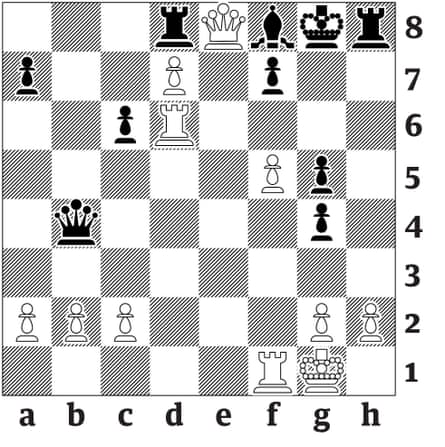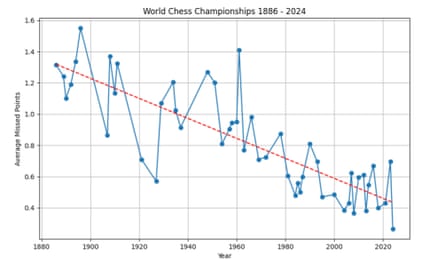China’s world champion, Ding Liren, and his Indian opponent, Gukesh Dommaraju, at 18 the youngest ever title challenger, are deadlocked at 4.5-4.5 after nine of their scheduled best of 14 games in Singapore. Game 10 starts at 9am GMT on Saturday.
If they are still level after their 14th and final classical game next Thursday, half-hour rapid and, if needed, three-minute blitz tie-breakers will decide the winner next Friday.
As the match has progressed, so their different approaches have become more evident. Gukesh has clearly prepared in depth in a variety of openings, notably in game seven where his subtle 7 Re1, creating a small edge against a variety of Black structures, was outside the top 10 computer choices and was highly praised by the world No 1 Magnus Carlsen, who abdicated his classical crown last year but is still kibitzing the match.
Game seven was also Gukesh’s best opportunity to take the lead. After Ding blundered at the move 40 time control, Gukesh should have converted the technical endgame a passed pawn up, with an active rook and bishop against knight. Both missed wins in the rollercoaster game eight.
Ding’s opening repertoire has been offbeat and less focused on specifics, but has still been effective. His first four white games featured 1 e4, 1 d4, 1 Nf3 and 1 c4, while in game eight his two central pawns stayed at base until move 19, a championship record. While Gukesh has sought clarity, Ding has been ready for obscure positions.

Only two decisive games out of nine seems partly down to the time limit for the match, where the normal 30 seconds per move increment only applies from move 41. Additionally, there are just 30 minutes plus increment to complete the game. This has influenced the decision-making on both sides. In a match situation with few games left, it can seem more pragmatic to settle for half a point rather than risk overlooking a tactical finesse in a time scramble.
With just five classical games remaining, Ding in particular will be increasingly tempted to aim for speed tie-breaks, the format at which he beat Ian Nepomniachtchi in 2023 and also inflicted a rare defeat on Carlsen in the 2019 Sinquefield Cup. Gukesh has only two white classical games left to unleash an opening bomb, if he has one. Fide has ended the longstanding rule that the world championship loser is seeded to the next Candidates, so that either Ding or Gukesh must start the next title qualifiers from scratch.
Meanwhile, the battle for a place in the next Candidates, whose winner will challenge Ding or Gukesh in 2026, is already well under way. The US champion Fabiano Caruana, who met Carlsen for the crown in 2018, and Arjun Erigaisi, India’s world No 4, are close rivals in the Fide Circuit of major 2024 tournaments, whose winner takes a qualifying spot.
Both are in action this week, Caruana at the St Louis Masters, where he leads on 6/7 by half a point, and Erigaisi at the Qatar Open. where he is on 2.5/3, is half a point behind the leaders. If both finish first, the Candidates place will be decided by their respective performances at the World Rapid and Blitz on Wall Street, New York, at the end of December.

A graph posted on Reddit by user games-and-games based on analysis produced by the open-source Stockfish chess engine shows the missed chances in every world championship match since 1886. The methodology may be debatable, but the conclusions are broadly as expected, with major errors becoming fewer over the course of decades.
José Raúl Capablanca v Emanuel Lasker in 1921, where the Cuban won 4-0 with 10 draws and claimed he never had a losing position, was an outlier for its accuracy, while Mikhail Botvinnik v David Bronstein 1951 and even more Botvinnik v Mikhail Tal 1961 were more error-prone than other matches in that period.
Ding v Nepomniachtchi 2023 had more mistakes than other matches in the last decade, while analysis of the current series, claimed as the most accurate ever, stopped at game six, excluding the chaotic rollercoasters of games seven and eight.
3949 1 Rg6+! fxg6 (if Kh7 2 Qxf7+ Bg7 3 Qxg7 mate) 2 Qe6+! Kg7/h7 3 Qxg6 mate.

.png) 1 month ago
14
1 month ago
14













































